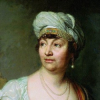Madame de Stael

Madame de Stael
Anne Louise Germaine de Staël-Holstein, commonly known as Madame de Staël, was a French woman of letters of Swiss origin whose lifetime overlapped with the events of the French Revolution and the Napoleonic era. She was one of Napoleon's principal opponents. Celebrated for her conversational eloquence, she participated actively in the political and intellectual life of her times. Her works, both critical and fictional, made their mark on the history of European Romanticism...
NationalityFrench
ProfessionWriter
Date of Birth22 April 1766
CountryFrance
Madame de Stael quotes about
Mystery such as is given of God is beyond the power of human penetration, yet not in opposition to it.
Strangers are contemporary posterity. [Fr., Les etrangers sont la posterite contemporaine.]
The only equitable manner in my opinion, of judging the character of a man is to examine if there are personal calculations in his conduct; if there are not, we may blame his manner of judging, but we are not the less bound to esteem him.
Men have made of fortune an all-powerful goddess, in order that she may be made responsible for all their blunder's.
Love is the history of a woman's life; it is an episode in man's. [Fr., L'amour est l'histoire de la vie des femmes; c'est un episode dans celle des hommes.]
How true it is that, sooner or later, the' most rebellious must bow beneath the yoke of misfortune!
Poetry is the apotheosis of sentiment.
Providence protects us in all the details of our lot.
Only the refined and delicate pleasures that spring from research and education can build up barriers between different ranks.
The education of life perfects the thinking mind, but depraves the frivolous.
Where no interest is takes in science, literature and liberal pursuits, mere facts and insignificant criticisms necessarily become the themes of discourse; and minds, strangers alike to activity and meditation, become so limited as to render all intercourse with them at once tasteless and oppressive.
The evil arising from mental improvement can be corrected only by a still further progress in that very improvement. Either morality is a fable, or the more enlightened we are, the more attached to it we become.
If we would succeed in works of the imagination, we must offer a mild morality in the midst of rigid manners; but where the manners are corrupt, we must consistently hold up to view an austere morality.
It seems to me that life's circumstances, being ephemeral, teach us less about durable truths than the fictions based on those truths; and that the best lessons of delicacy and self-respect are to be found in novels where the feelings are so naturally portrayed that you fancy you are witnessing real life as you read.